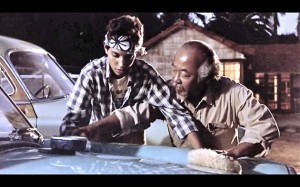I remember growing up and my parents would spell things out to each other when they didn't want my siblings and I to understand what they were talking about. And now I find Alexandra and I doing the same thing.For example, on the weekend we were planning out our day and I asked Alexandra if I should take Olivia and go for a s-k-i? And if we don't go to the hill I might suggest that we all go for a s-w-i-m.Because the thing is as soon as you mention anything along the lines of going skiing or to the pool you've basically promised them to go and do that activity. And if you don't deliver tears ensue. Usually on my part first and the kids follow suit shortly after.But the whole point of this is that what and how you say something matters. The same applies to coaching as well.Let's take a moment to look at what you say and how to say it when coaching.What You SayHave you ever travelled to a foreign country and there is a North American tourist trying to communicate to someone in English? The North American is typically looking for directions and the local person doesn't speak English. Instead of looking for someone to translate, or using hand gestures or a different approach, the tourist simply speaks louder and slower.[caption id="attachment_5441" align="aligncenter" width="300"] Tourists sometimes think speaking louder and more slowly leads to comprehension.It's as though the breakdown in communication is a result of a hearing difficulty or auditory processing.We've all seen and been embarrassed by one of our own countrymen, or relatives, acting in this way.Coaching is similar.When we are looking to convey feedback to a client it makes no sense to speak Greek to an English speaker. Or in the case of anatomy,...
How to Cue Movement
- Chris Collins
- Fitness
- Training
- Injury Prevention
- 1886 Hits
- 0 Comments
-
If you're like most people there are certain movements that are more difficult than others to perform. For some people this may be an overhead squat. For others this may be doing a wall slide. And for others still this may be simply getting their own body-weight off the ground. The question as to why people can't do overhead squats, wall slides or get ups is too varied to address in a single blog post. But with each of these movements there are common mistakes many people make. And with each of these mistakes there are better ways to correct. https://www.youtube.com/watch?v=N73AnUp3m2w For example a person doing a wall slide may extend through the low back and tilt their rib cage up in order to keep the hands in contact with the wall. And to correct this you might hear a coach simply say 'hide your rib cage' meaning don't let it tilt up towards the ceiling. And while this is not a bad cue there are better options. Before we get what a better option might be to correct this movement let's talk about movies for a second. Hopefully some of you are old to remember the Karate Kid. And I don't mean the one with Will Smith's son. I'm talking about the original Mr. Miyagi. Now do you remember how Mr. Miyagi taught Daniel-san how to do karate? He had him do all his chores. Wax on, wax off...ring a bell? [caption id="attachment_4545" align="aligncenter" width="300"] This drill only works if you're wearing a karate headband. Mr. Miyagi didn't use any words related to karate or body parts. Instead he used an analogy of doing a particular chore to simplify the process and get in quality repetitions. Fast forward a number of years to last month. I had a proud moments while...

